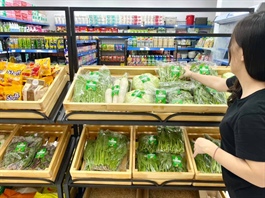Textile and apparel firms struggling amid interest woes
Textile and apparel firms struggling amid interest woes
Many textile and apparel firms have had to postpone investment and expansion plans in the face of soaring interest rates, high production costs and dwindling order intake.

Pham Van Viet, chairman of Viet Thang Jeans Co. Ltd., noted that businesses in the textile and apparel sector are experiencing pressure from multiple sources, from interest rate hikes to exchange rate volatility, that are having a direct impact on the ability to import materials for production.
“We have decided not to borrow more at this time, despite having demand for investment expansion," said Viet. "We initially planned to invest in five new production lines, each costing $5 million. However, currently we are only able to perform moderate production without incurring losses, so we must temporarily delay our investment plans," he said.
Meanwhile, Pham Quang Anh, director of Dony Garment Co. Ltd. in Ho Chi Minh City, unveiled that the company had intended to build a new plant last year with an approximate capacity of 60,000-70,000 tonnes per month in Binh Tan district, while also preparing to acquire brand-new modern equipment in a bid to expand the reach of its products.
“The period from late 2022 to early this year saw many uncertainties in the sector’s production and business practices. Coupled with unfavourable global market sentiment, this resulted in the suspension of our plans. We hope to resume as soon as we see more positive signs, maybe next year or 2025,” said Anh.
Similarly, Tong Thi Tra My, deputy director of Navitex International Co. Ltd. in Hanoi said, “Early last year, we decided to expand our offices and warehouses in several localities, but with the current high cost of borrowing, we simply do not have enough capital to expedite the plan.”
If the situation drags on, it could cast a shadow over the textile and apparel sector’s development prospects over the next 3–5 years.
The high interest rates are not only causing firms to postpone expansion, they are also limiting investment into equipment upgrades, thereby slowing the pace of modernisation and automation in the sector. This could badly affect competitiveness in the global market, as well as causing firms to miss out on opportunities for new orders due to limited capacity.
If the situation drags on, it could cast a shadow over the textile and apparel sector’s development prospects over the next 3–5 years.
In order to survive the current tough times, Viet of Viet Thang Jeans said, "Firms should diversify supply sources and keep a large volume of material in stock to be well-prepared to take on new orders."
Quang Anh from Dony Garment revealed that his strategy was to avoid investing in new equipment and simply lease new machines to avoid the use of fixed capital resources.
Meanwhile, Tami Co.'s Pham Tam said, "The State Bank of Vietnam should control the interest ceiling and keep the lending rate at 8-8.5 per cent per year, along with tax reductions until the end of the year to support troubled firms."






















